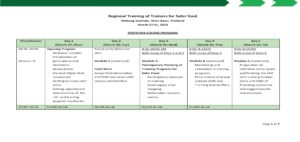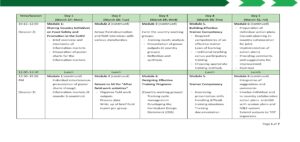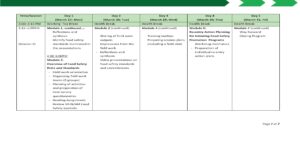
The world is becoming more complex as it faces environmental, economic, and social challenges. The growing population, increasing rates of poverty and hunger, climate change and environmental degradation pose threats to food security. Technological advances in food and non-food production while providing benefits also can also pose threats to human health and safety. The basic question now is whether the food on our table is safe and of good quality.
Because of the growing concern on food safety, international organizations, including the GMS and ASEAN have been devising mechanisms to ensure the quality of the food products that are available in local and international markets. Food safety standards, the benefits, as well as risks and hazards need to be promoted to the different stakeholders along the food value chain.
The Mekong Institute is organizing a five-day course on Training of Trainers for Safer food targeting development professionals involved in various aspects of food safety and its promotion in the Cambodia, Lao PDR, Myanmar, and Vietnam (CLMV) countries. This Training of Trainers course emphasizes interaction and learning together among CLMV country participants. It shall be delivered in six interrelated modules utilizing a variety of interactive and experiential learning methods and tools. Toward the end of the course, participants shall prepare re-entry action plans integrating the knowledge and skills they learned from the training in order to initiate effective food safety promotion programs in their home countries.
This Training of Trainers aims to build the capacity of development professionals on planning and designing effective training programs that will enable them to create an enabling environment for knowledge and skills building among multi-stakeholders involved in Food Safety promotion.
By the end of this Training of Trainers’ Course, participants should be able to:
1.1. Compare country experiences on food safety promotion in the CLMV
1.2. Discuss the various food safety standards and international commitments
1.3. Conduct participatory planning and design of training programs for safer food including use of participatory monitoring and evaluation tools and techniques
1.4. Enhance their competency as effective trainers
1.5. Prepare re-entry action plans to initiate food safety promotion programs in their home countries
The course shall consist of sharing experiences, guided lecture discussions, hands-on practice, planning exercises, information markets, group work, mini-plenary presentation of group outputs and other interactive learning methods. Learning games, case analysis and role playing shall be used to facilitate participatory processes and emphasize participant-oriented active learning. Lecture shall be kept to a minimum. Small group discussions shall be employed to explore participants’ understanding about the topics. Participants will have an exposure field work to some aspects of food safety but at the same time reflect on how such an activity is organized and implemented as part of their learning exercise. Each participant shall prepare a re-entry action plan that they can implement in their work back home. Qualified and well-experienced training facilitators and resource persons shall guide and coach the participants throughout the learning program.
This Training of Trainers course is designed for development professionals from Cambodia, Lao PDR, Myanmar and Vietnam involved in conducting training on different aspects of food safety and its promotion in their home countries.
Before attending the training course, participants are requested to prepare a poster or chart to share their work experience related to their involvement in food safety issues or in promotion it. They are also encouraged to bring some brochures, pictures or project reports related to food safety promotion in their countries.
The Training of Trainers will be conducted from March 27-31, 2023 at the Mekong Institute Residential Training Center Khon Kaen, Thailand.
The course includes six modules to be delivered in five consecutive days.
Module 1 – Sharing Country Initiatives on Food Safety and Promotion in the CLMV
Module 2 – Overview of Food Safety Risks and Standards
Module 3 – Planning and Designing Effective Training Programs for Safer Food
Module 4 – Participatory Tools and Techniques for Interactive Training Programs
Module 5 – Building Effective Trainer Competency
Module 6 – Re-entry Action Planning for Initiating Food Safety Promotion Training Programs
Module 1: Sharing Country Initiatives on Food Safety and Promotion in the CLMV
This module provides a venue where participants can exchange and share information about their work involvement in various aspects of food safety and how they are promoting it in their respective countries. From the country presentation, the participants shall be able to distill lessons learned, challenges met and strategies to overcome them, good practices and success stories which they may apply in their own country situations. They will also get a broader perspective of how food safety programs are being implemented among countries in the GMS.
Module 2: Overview of Food Safety Risks and Standards
Following Mekong Institute’s guiding principle of “Learn to Do, Do to Learn”, participants shall learn hands on situation analysis and understanding of food safety issues, risks, hazards, and good practices. Using their real life country situations, they will conduct situation analysis with supply chain mapping and other analytical tools, prepare mini-surveys, role play dialoguing, and data collection skills and report writing. Relevant video presentations shall be shown to participants to provide an overview of Food Safety standards and commitments in the GMS, Southeast Asian region, and other countries.
Module 3. Planning and Designing Effective Training Programs for Safer Food
Participants shall assess capacity building needs of intended training beneficiaries. Results shall provide the basis for planning relevant training programs. Participants shall learn concepts and go through real practical experience in applying the principles in designing training programs that meet the needs of particular stakeholders. Participatory learning goes along with the iterative implementation of the training cycle. Participants are given an active role in the design, redesign, and decision-making in all stages of the training cycle. Participants shall have practical sessions in developing Curriculum Design Statements (CDS) and preparing Training Session Plans including organizing a field work. They shall also review some Training Tools that may also be modified for use in monitoring day-to-day progress and evaluating the effectiveness of training programs.
Module 4: Participatory Tools and Techniques for Interactive Training Programs
This module starts with activities that are essential for enabling open participation in training programs. Participants shall be equipped with appropriate facilitation tools and techniques using Visualization in Participatory Programs (VIPP) that encourage interactive and effective learning among themselves and in training programs they will conduct in the future. Exchange of experiences and knowledge about each method and tool shall be encouraged. In addition, this session shall give an overview of adult learning principles and also cover activities, approaches, methods, attitudes, and behaviors in participatory processes that are essential for enabling stakeholders to participate actively in sharing, analyzing and enhancing their knowledge and skills in planning and managing training programs or other capacity building events.
Module 5. Building Effective Trainer Competency
This module focuses on the main roles and attitudes of a good trainer. It further elaborates on the required core competencies of effective training facilitators. Buzz groups shall be formed to reflect on the opportunities as well as fears and challenges faced by a trainer. Core elements of effective communication shall be emphasized in this module through a learning game. Participants’ facilitation skills shall be challenged through analysis of case scenarios. Participants will go through exercises on how to manage different intervention scenarios, handle difficult group dynamics, foster inclusive solutions, and ensure optimum participation among stakeholders.
Module 6. Re-entry Action Planning for Initiating Food Safety Promotion Training Programs
This module focuses on the integration of different skills, knowledge, and attitudes gained from the training and how these can be applied to their real work situation related to food safety promotion in their home countries. Each of the participants shall prepare a re-entry action plan that they can implement in their work back home. Participants shall be introduced to a simple matrix to guide them how to develop their re-entry action plans. The re-entry action plans shall be shared with other participants through plenary presentations to open for feedback, comments and suggestions for improvement. Individual action plans may be to be implemented as a collaborative effort among participants in the same country.




